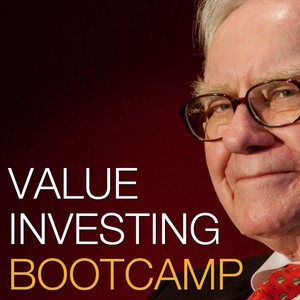
Ep 191: Rethinking Emergency Funds for modern times
12/09/24 • 37 min
We’re still revisiting fundamentals and this week we’re asking: Is your emergency fund actually an emergency fund, or just a well-intentioned savings account collecting dust (and maybe a tiny bit of interest)?
In this episode, we unpack the truth about financial emergencies and reveal the flawed logic behind the old ‘3-months of expenses’ rule. Let’s be honest, climate change, unexpected job losses, and ridiculously high repair costs have made the classic “cash only” emergency fund advice obsolete. We talk about building a real safety net, one that's flexible, accessible, and addresses everything from the cost of repairs to those unexpected crises that inevitably spring up in life
Building an emergency fund isn’t about striving for perfection; it’s about protecting what matters most. We’ll provide practical tips, address common anxieties, and leave you with a renewed sense of preparedness – all without losing your mind (or your savings).
We discuss:
- The Illusion of the "Checked Box": Why the standard 3-6 month emergency fund is inadequate for the unpredictable realities of 21st-century life
- The importance of liquidity and accessibility: It's not enough to have the money, you need to be able to access it quickly and easily. We'll dissect the hidden fees and frustrating bureaucratic hurdles that can turn your carefully-saved emergency fund into a useless paperweight
- More than just cash: We discuss the overlooked role of insurance, lines of credit, and community resources in weathering life’s storms. This isn't just about finances; it's about creating a comprehensive plan that addresses all dimensions of an emergency
- The Multi-Layered Approach: Why cash is still surprisingly relevant, even in a cashless society.Real-life examples that illustrate why diversifying your financial institutions is no longer a "luxury" but a necessity
- The Rebuilding Phase: A practical plan for rebuilding your emergency fund in the wake of a crisis. Because let’s face it, emergency situations aren't one-and-done
Links:
- Episode 156: Survive & Advance | The Ultimate Guide to Financial Resilience with Lynnette Khalfani Cox (YouTube Link)
- Episode 184: How to Automate your savings (and finally get ahead) (YouTube Link)
Connect with Julien and Kiersten on our website, Instagram, Twitter, and YouTube.
Join our email list to get updates from us, opportunities for discounts, freebies and a quick rundown on the relevant financial and career news impacting your life.
Get our book Cashing Out: Win the Wealth Game by Walking Away, named 2023 best overall book about investing by Business Insider and one of the best personal finance books by Forbes
If you would like to learn more about investing, check out our newest class, Making Money Grow
We’re still revisiting fundamentals and this week we’re asking: Is your emergency fund actually an emergency fund, or just a well-intentioned savings account collecting dust (and maybe a tiny bit of interest)?
In this episode, we unpack the truth about financial emergencies and reveal the flawed logic behind the old ‘3-months of expenses’ rule. Let’s be honest, climate change, unexpected job losses, and ridiculously high repair costs have made the classic “cash only” emergency fund advice obsolete. We talk about building a real safety net, one that's flexible, accessible, and addresses everything from the cost of repairs to those unexpected crises that inevitably spring up in life
Building an emergency fund isn’t about striving for perfection; it’s about protecting what matters most. We’ll provide practical tips, address common anxieties, and leave you with a renewed sense of preparedness – all without losing your mind (or your savings).
We discuss:
- The Illusion of the "Checked Box": Why the standard 3-6 month emergency fund is inadequate for the unpredictable realities of 21st-century life
- The importance of liquidity and accessibility: It's not enough to have the money, you need to be able to access it quickly and easily. We'll dissect the hidden fees and frustrating bureaucratic hurdles that can turn your carefully-saved emergency fund into a useless paperweight
- More than just cash: We discuss the overlooked role of insurance, lines of credit, and community resources in weathering life’s storms. This isn't just about finances; it's about creating a comprehensive plan that addresses all dimensions of an emergency
- The Multi-Layered Approach: Why cash is still surprisingly relevant, even in a cashless society.Real-life examples that illustrate why diversifying your financial institutions is no longer a "luxury" but a necessity
- The Rebuilding Phase: A practical plan for rebuilding your emergency fund in the wake of a crisis. Because let’s face it, emergency situations aren't one-and-done
Links:
- Episode 156: Survive & Advance | The Ultimate Guide to Financial Resilience with Lynnette Khalfani Cox (YouTube Link)
- Episode 184: How to Automate your savings (and finally get ahead) (YouTube Link)
Connect with Julien and Kiersten on our website, Instagram, Twitter, and YouTube.
Join our email list to get updates from us, opportunities for discounts, freebies and a quick rundown on the relevant financial and career news impacting your life.
Get our book Cashing Out: Win the Wealth Game by Walking Away, named 2023 best overall book about investing by Business Insider and one of the best personal finance books by Forbes
If you would like to learn more about investing, check out our newest class, Making Money Grow
Previous Episode

Ep 190: Is 'buy and hold' still relevant?
We took a mini-break (and you KNOW we needed it) but we're back, and today we're tackling the sacred cow of financial planning: BUY AND HOLD.
Let's face it, investing isn't a spectator sport and the pandemic proved that even the most "set-it-and-forget-it" advice can get messy. Plus research shows investors are holding stocks for less time than ever before. So this week, we’re asking if the classic "buy and hold" strategy is still the cornerstone of financial wisdom, or has the rise of day trading, sports betting, and cryptocurrencies rendered it obsolete?
Don't expect simple answers, because investor psychology isn’t that simple, but we promise some surprisingly insightful takeaways
We explore:
- Why “buy and hold” is the American way and what that means in the era of instant notifications and market fluctuations
- How the emotional and psychological realities of modern life challenge even the most well-laid financial plans
- The rise of “bro-conomy” investing, and why the appeal of day trading and sports betting is harder to resist
- How to use robo-advisors to tame your inner FOMO without losing your shirt (or your retirement funds)
- The importance of financial literacy and diversification, beyond the simplistic "buy and hold" mantra
- A peek behind the curtain into our own HSA investment strategy and a warning about the illusion of easy wins
Links:
- The Three Pillars of the Bro-Economy via The Atlantic
- Episode 171: Why you need a brokerage account
Connect with Julien and Kiersten on our website, Instagram, Twitter, and YouTube.
Join our email list to get updates from us, opportunities for discounts, freebies and a quick rundown on the relevant financial and career news impacting your life.
Get our book Cashing Out: Win the Wealth Game by Walking Away, named 2023 best overall book about investing by Business Insider and one of the best personal finance books by Forbes
If you would like to learn more about investing, check out our newest class, Making Money Grow
Next Episode

Ep 192: How we eat good without going broke
The latest inflation report shows that grocery prices are back up, making something as basic as eating feel like a financial tightrope walk. So this week, we're rethinking how we define "good" food and making a case that the best meals can be both cheap and delicious by sharing 3 of our favorite cheap meals.
Hopefully you walk away from this episode feeling slightly less guilty about that impulse takeout order (as long as you learn from it), inspired to rethink what's possible with your budget and your kitchen, and empowered to create satisfying meals that don’t break the bank.
We discuss:
- The joy (and necessity) of finding delicious, affordable food that doesn't taste like you’re pinching pennies (or just eating sadness)
- Practical tips for making flavorful, budget-friendly meals that are both nourishing and satisfying
- A closer look into our favorite meals, complete with pricing breakdowns and the secret ingredients to take them from "meh" to "magnificent"
- The importance of cross-utilization and how it can help you maximize your grocery budget.
Links:
- Food prices rose 28% in 5 years - Money on the Table S3:E3 “How much is enough?” feat. crispy skin salmon- How to save money by trimming a beef tenderloin
Connect with Julien and Kiersten on our website, Instagram, Twitter, and YouTube.
Join our email list to get updates from us, opportunities for discounts, freebies and a quick rundown on the relevant financial and career news impacting your life.
Get our book Cashing Out: Win the Wealth Game by Walking Away, named 2023 best overall book about investing by Business Insider and one of the best personal finance books by Forbes
If you would like to learn more about investing, check out our newest class, Making Money Grow
If you like this episode you’ll love
Episode Comments
Generate a badge
Get a badge for your website that links back to this episode
<a href="https://goodpods.com/podcasts/rich-and-regular-with-kiersten-and-julien-saunders-203425/ep-191-rethinking-emergency-funds-for-modern-times-79889424"> <img src="https://storage.googleapis.com/goodpods-images-bucket/badges/generic-badge-1.svg" alt="listen to ep 191: rethinking emergency funds for modern times on goodpods" style="width: 225px" /> </a>
Copy




